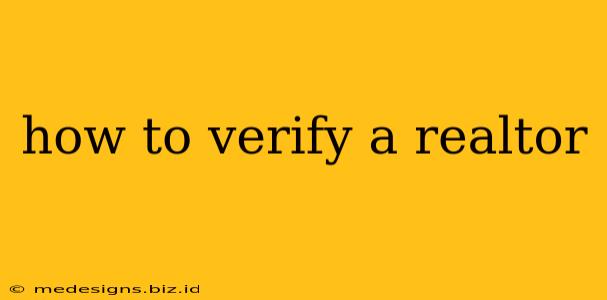Buying or selling a home is a significant financial decision, making it crucial to work with a trustworthy realtor. Unfortunately, not everyone claiming to be a realtor is legitimate. This guide outlines how to verify a realtor's credentials and protect yourself from potential scams.
Key Steps to Verify a Realtor's Legitimacy
Before entrusting your real estate needs to anyone, take these vital steps to verify their legitimacy:
1. Check Their Real Estate License:
This is the most crucial step. Every legitimate realtor must hold a valid real estate license issued by their state's regulatory body. You can usually find this information by:
- Searching your state's real estate commission website: Each state has a governing body responsible for licensing realtors. Their websites typically have a license verification tool where you can search by name, license number, or other identifying information. This will confirm their licensing status, license expiration date, and any disciplinary actions taken against them.
- Asking for their license number: A legitimate realtor will readily provide their license number. Don't hesitate to ask!
2. Verify Their Brokerage Affiliation:
Reputable realtors are associated with established brokerage firms. You should:
- Confirm the brokerage's legitimacy: Look up the brokerage firm online. Check their website for contact information, physical address, and client testimonials. Be wary of brokerages with limited online presence or those that are difficult to contact.
- Check for online reviews and complaints: Sites like Yelp, Google Reviews, and the Better Business Bureau (BBB) can provide valuable insights into the brokerage's reputation and customer experiences.
3. Investigate Their Professional Background:
Beyond licensing and brokerage affiliation, take the time to learn more about the realtor's experience and expertise:
- Ask about their experience: Inquire about their years of experience, the number of transactions they've handled, and their specialization (e.g., residential, commercial, luxury properties).
- Check online profiles: Many realtors have professional profiles on websites like Zillow, Realtor.com, and their brokerage's website. These profiles often include their contact information, experience, and client testimonials.
- Look for professional designations: Certain designations, such as Certified Residential Specialist (CRS) or Accredited Buyer's Representative (ABR), demonstrate a realtor's commitment to professional development and specialized expertise.
4. Look for Red Flags:
Be vigilant for signs that something might not be right. Some red flags include:
- High-pressure sales tactics: A legitimate realtor will not pressure you into making a quick decision.
- Unrealistic promises: Be wary of promises that sound too good to be true.
- Lack of transparency: A realtor who is unwilling to answer your questions or provide documentation should be viewed with suspicion.
- Requests for payment outside the established process: Legitimate real estate transactions follow specific payment procedures; anything outside of that should raise concerns.
Beyond Verification: Building Trust
While verifying a realtor's credentials is crucial, building trust is an ongoing process. Choose a realtor who:
- Communicates effectively: They should keep you informed throughout the process and respond promptly to your questions.
- Listens to your needs: They should understand your requirements and work to find the best solution for you.
- Acts professionally and ethically: They should adhere to high standards of conduct and transparency.
By following these steps, you can significantly reduce the risk of encountering fraudulent or unprofessional realtors. Remember, taking the time to thoroughly verify a realtor's credentials is an investment in protecting your financial interests and ensuring a positive real estate experience.
